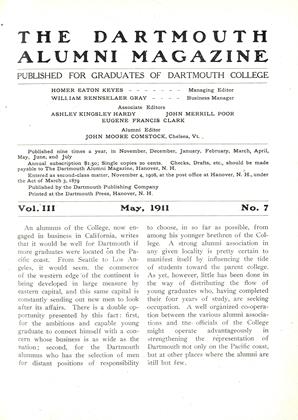The most important event as yet scheduled in the history of the Tuck School of Administration and Finance is the Tuck School Conference on Scientific Management to be held in Hanover October 12 to 14, announcement of which has recently been made by Professor H. S. Person, Director of the School. Professor Person has had the idea of such a conference for some time in mind, but has kept the matter secret until he could be certain of presenting a program which should carry the names of the leading authorities on the science of. business. A glance at the program as given below carries sufficient assurance of the eminence of the men who are to be brought together.
Frederick W. Taylor of Philadelphia who opens the conference with an address on "The Principles of Scientific ; Management" is the man most widely : known as the first to promulgate and apply these principles and is the one most frequently quoted in the numerous articles on the subject which have recently been published. But little less prominent is Henry L. Gantt of New York, who has written not a little on the subject of business efficiency and is frequently heard at the meetings of the American Society of Mechanical Engineers. Harrington Emerson, head of the Emerson Company, efficiency engineers, of New York, is a specialist in railroad matters and is authority for some of the statements regarding railroad efficiency which made so great a sensation in the recent railroad rate inquiry. Henry P. Kendall represents the application of efficient methods to the printers' business at the Plympton Press, Norwood, Mass. James M. Dodge, now chairman of the board of directors of the Link.Belt Company of Philadelphia, formerly president of the company, and at one time president of the American Society of Mechanical Enginers, has been largely responsible for the application of modern methods in the upbuilding of the largest manufactory of conveying machinery. The relation between expert accounting and business efficiency is represented in the person of Frederick A. Cleveland of New York, who has won distinction by his ability in applying accounting to the problems of public business, and who is at present chairman of the committee appointed by President Taft to investigate the business methods of government departments at Washington. The conference is called for the benefit of the manufacturers and business men of New Hampshire and of neighboring states and it is confidently expected that a large number will avail themselves of the opportunity not only to hear, but to come into close personal contact with the leaders in the movement for superior business administration. The program, as at present outlined, follows:
THURSDAY EVENING, OCTOBER 12
Chairman:
8.00 P. M. The Principles of Scientific Management—Frederick W. Taylor, Philadelphia.
FRIDAY FORENOON, OCTOBER. 13
Chairman: Benjamin A. Kimball, Concord, N. H. 9.30 A. M. The Task and the Proper Day's Work—Henry' L. Gantt, New York. 10.30 A. M. The Opportunity of Labor Under a System of Scientific Management-Harrington Emerson, New York.
FRIDAY AFTERNOON, OCTOBER 13
Chairman: Charles H. Jones, Boston 1.30 P. M. Types of Management: Unsystematized, Systematized and Scientific—Henry P. Kendall, Norwood, Mass,
2.30 P. M. The Spirit in Which Scientific Management Should Be Approached—James M. Dodge, Nicetown, Philadelphia. 3.30 P. M. Round Table Conferences, as follows:— A. Scientific Management in Machine Manufacture. B. Scientific Management in Textile Manufacture. C. Scientific Management in Shoe Manufacture. D. Scientific Management in Printing and Publishing. E. Scientific Management m Pulp and Paper Manufacture. F. Efficiency in Lumbering and in the Management of Timber Properties. G. Academic Efficiency.
FRIDAY EVENING, OCTOBER 13
Chairman: Honorable Robert P. Bass, Governor of New Hampshire 8.00 P. M. The Application of the Scientific Method to the Activities of the State—Frederick A. Cleveland, New York.
SATURDAY FORENOON, OCTOBER 14
Chairman: James Logan, Mayor, Worcester, Mass. 9.30 A. M. The Application of Business Methods to the Government of a Municipality. 10.30 A. M. Discussion of the Two Preceding Addresses. Opened by the Chairman.
 View Full Issue
View Full Issue
More From This Issue
-
 Article
ArticleWINTER WEATHER RECORDS AT HANOVER, N. H.
May 1911 By J.M. Poor -
 Article
ArticleFACULTY WORK FROM THE INSIDE
May 1911 By Charles F. Richardson -
 Article
ArticleAn alumnus of the College, now engaged
May 1911 -
 Class Notes
Class NotesLOCAL ASSOCIATIONS
May 1911 -
 Article
ArticleBaseball
May 1911 -
 Class Notes
Class NotesCLASS OF 1908
May 1911 By Laurence M. Symmes








